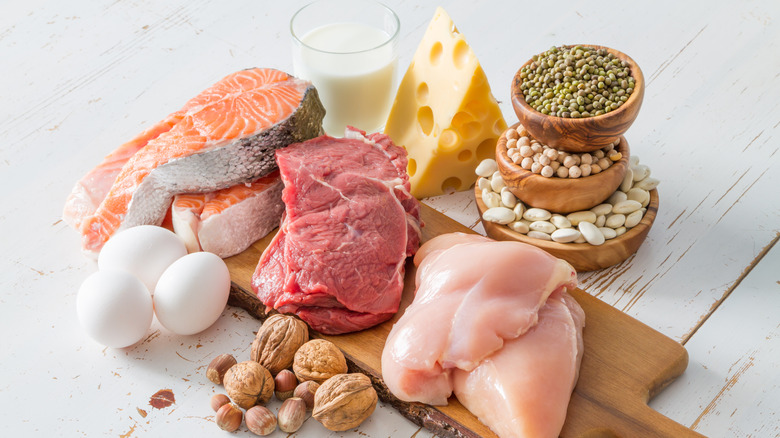Registered Dietitian Explains When Too Much Protein Can Become A Problem
Protein can be found in meat-based sources as well as plant-based sources. Whether you opt to get your protein from beef, chicken, tofu, or elsewhere, this macronutrient helps fuel our body with the energy it needs. Not only that, but protein plays an important role in many of our body's different systems, as it helps support heart health, immune function, bone strength, and more, according to WebMD.
While it's easy to think we should be loading up on protein to reap all its various health benefits, Health Digest spoke with Jamie Feit, MS, RD, CDN owner of Jamie Feit Nutrition, LLC, who explained that it is possible to have too much of a good thing. She starts off by explaining how protein is used within the body. "Protein is one of the macronutrients found in food. It is a necessity for us to consume as we use protein for growth, repair, satiety and blood glucose stabilization," Feit states. "Protein is broken down in our bodies into amino acids. The amino acids are then used for transport in the body, to keep fluids balanced, a factor in blood clotting and important for immune function," she says.
Who should avoid high-protein diets
"The recommended daily amount of protein is 0.8g/kg of body weight," Feit tells Health Digest. "That is based on the rate that our GI tract can absorb dietary protein in relation to how well our liver can break it down and excrete it," she explains. However, Feit notes that there is a recommended limit as to how much more protein one should consume daily. "The maximum amount of protein recommended is when 25% of our dietary intake is coming from protein," she says. "That amount translates to approximately 2-2.5 g protein per Kg of body weight. Healthy individuals could safely consume that amount without adverse side effects." Feit notes how some individuals, such as bodybuilders or athletes, tend to have these higher protein diets.
Feit goes on to explain that high-protein diets are not advised for everyone, particularly young kids and older adults. "Children and elderly people have specific recommended amounts for daily intake that should be followed as their bodies will have difficulty handling more," she advises. Feit concludes the interview by stating that those with certain health conditions are also advised to stick with the recommended daily intake of protein for the average adult. "People with kidney disease or gout need to consume adequate amounts of protein, 0.8g/kg max as their bodies will not be able to clear the byproducts of protein metabolism," she states.


